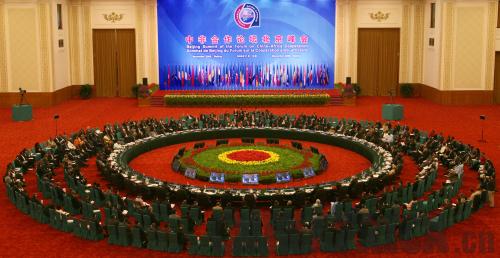|
 |
|
Beijing Summit of FOCAC in Beijing in November 2006 (JU PENG) |
After a decade of robust development, the Forum on China-Africa Cooperation (FOCAC), a mechanism bridging the world's largest developing country and the world's largest developing continent, is preparing for development in the next decade with great optimism.
The Eighth Senior Official Meeting of FOCAC is scheduled for October 26-27 this year in Hangzhou in east China's Zhejiang Province. Here, implementation of agreements reached at the Fourth FOCAC Ministerial Meeting in Sharm el Sheikh, Egypt in late 2009 will be evaluated, and preparations made for the fifth event.
"Actually, this meeting is held at a very important juncture when the forum has wrapped up its first decade of work and is unfolding the work in the new decade," Liu Tao, Deputy Director of the Office of the Chinese Follow-Up Committee of FOCAC told ChinAfrica.
The First FOCAC Ministerial Meeting was held in October 2000 in Beijing, which, according to Yang Jiechi, Minister of Foreign Affairs of China, indicated the beginning of the new historical development phase of Sino-African traditional friendship and cooperation. Liu said the forum "has greatly promoted Sino-African relations in various fields."
Vibrant exchanges
"The FOCAC established a decade ago has substantively promoted the development of new type of strategic partnership between China and Africa," said Xi Jinping, Vice President of China at the symposium commemorating the 10th anniversary of the establishment of FOCAC in Pretoria, South Africa.
The past decade after the establishment of FOCAC witnessed the most active high-level visits and personnel exchanges between the two sides. Every regular ministerial meeting had participants of Chinese and African countries' state leaders. At the Beijing FOCAC Summit in November 2006, representatives from 48 African countries came to Beijing, including 42 state and government leaders.
"This is the international meeting with the largest scale, the highest level and the largest number of state and government leaders the People's Republic of China has ever held since its founding in 1949," said Yang Jiechi, adding that the summit is a milestone in Sino-African relations development.
Meanwhile, under the framework of FOCAC, a series of activities such as seminars, training and consultations are held on a regular basis.
At the Fourth FOCAC Ministerial Meeting, Chinese Premier Wen Jiabao said China would increase government scholarships to African students. Statistics show that in 2010, more than 16,000 African students studied in China, including more than 5,700 studying on a Chinese Government Scholarship.
Business boom
Business between China and African countries has escalated dramatically in the past decade. Sources from the Ministry of Commerce show that in 2000, the bilateral trade between China and Africa was only $10 billion; last year, the figure reached $126.9 billion. In addition, China's investment in Africa in 2010 was $1 billion.
China is now the largest trade partner of Africa and Africa is China's fourth largest overseas investment destination. China has contributed more than 20 percent of Africa's economic growth in recent years.
China is also serious about balancing bilateral trade. Starting 2005, China exempted tariffs on 478 items imported from 31 least developed African countries. In addition, China also established an African products exhibition center in Yiwu City, Zhejiang Province, China's largest small commodity distribution center. African business people can exhibit their commodities in the 5,000-square-meter center for free.
By the end of 2009, China had exempted more than 300 debt amounts from 35 impoverished African countries. Meanwhile, under the framework of FOCAC, China and African countries also have effective cooperation in areas of infrastructure construction, energy, agriculture and medical care.
Future plans
According to Chen Deming, Minister of Commerce, in the past 10 years, all the measures proposed by FOCAC have been implemented, bringing substantial interests for both parties.
"We must, on the one hand, consolidate the abundant achievements we have made in the past decade of FOCAC operation and tap the cooperation potentials in areas such as investment, trade and infrastructure construction; on the other hand, measures should be taken to expand new cooperation areas," said Chen.
New technologies are also bringing more cooperation areas between China and African countries. According to Chen, logistics, shipment and clean energy are some areas that can provide improved cooperation between China and African countries. He also suggested cooperation in areas such as the service trade, technology transfer, human resource development and sharing of development experience be strengthened in the future under the framework of FOCAC.
|